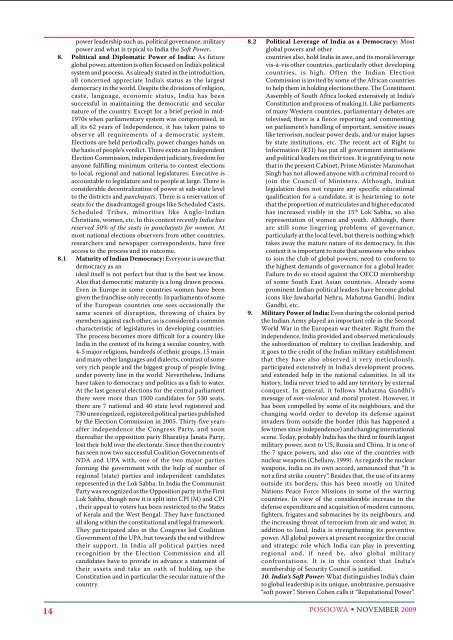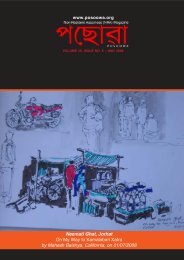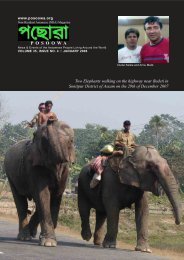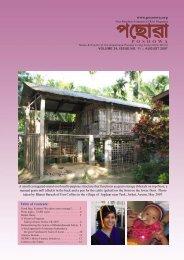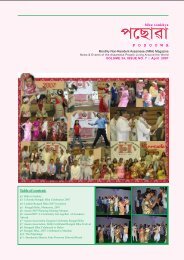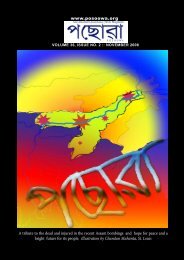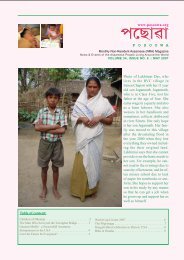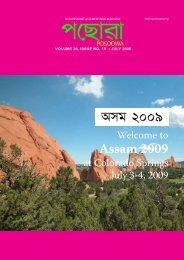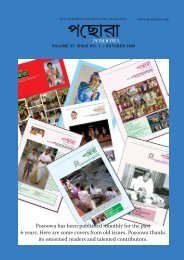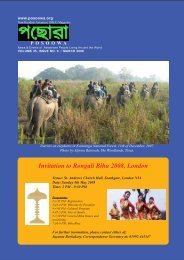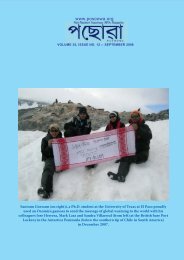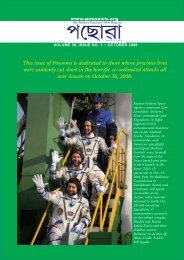India's youngest CEO Ranjan Das of SAP, India ... - Posoowa
India's youngest CEO Ranjan Das of SAP, India ... - Posoowa
India's youngest CEO Ranjan Das of SAP, India ... - Posoowa
You also want an ePaper? Increase the reach of your titles
YUMPU automatically turns print PDFs into web optimized ePapers that Google loves.
power leadership such as, political governance, military<br />
power and what is typical to <strong>India</strong> the S<strong>of</strong>t Power.<br />
8. Political and Diplomatic Power <strong>of</strong> <strong>India</strong>: As future<br />
global power, attention is <strong>of</strong>ten focused on <strong>India</strong>’s political<br />
system and process. As already stated in the introduction,<br />
all concerned appreciate <strong>India</strong>’s status as the largest<br />
democracy in the world. Despite the divisions <strong>of</strong> religion,<br />
caste, language, economic status, <strong>India</strong> has been<br />
successful in maintaining the democratic and secular<br />
nature <strong>of</strong> the country. Except for a brief period in mid-<br />
1970s when parliamentary system was compromised, in<br />
all its 62 years <strong>of</strong> Independence, it has taken pains to<br />
observe all requirements <strong>of</strong> a democratic system.<br />
Elections are held periodically, power changes hands on<br />
the basis <strong>of</strong> people’s verdict. There exists an Independent<br />
Election Commission, independent judiciary, freedom for<br />
anyone fulfilling minimum criteria to contest elections<br />
to local, regional and national legislatures. Executive is<br />
accountable to legislature and to people at large. There is<br />
considerable decentralization <strong>of</strong> power at sub-state level<br />
to the districts and panchayats. There is a reservation <strong>of</strong><br />
seats for the disadvantaged groups like Scheduled Casts,<br />
Scheduled Tribes, minorities like Anglo-<strong>India</strong>n<br />
Christians, women, etc. In this context recently <strong>India</strong> has<br />
reserved 50% <strong>of</strong> the seats in panchayats for women. At<br />
most national elections observers from other countries,<br />
researchers and newspaper correspondents, have free<br />
access to the process and its outcome.<br />
8.1 Maturity <strong>of</strong> <strong>India</strong>n Democracy: Everyone is aware that<br />
democracy as an<br />
ideal itself is not perfect but that is the best we know.<br />
Also that democratic maturity is a long drawn process.<br />
Even in Europe in some countries women have been<br />
given the franchise only recently. In parliaments <strong>of</strong> some<br />
<strong>of</strong> the European countries one sees occasionally the<br />
same scenes <strong>of</strong> disruption, throwing <strong>of</strong> chairs by<br />
members against each other, as is considered a common<br />
characteristic <strong>of</strong> legislatures in developing countries.<br />
The process becomes more difficult for a country like<br />
<strong>India</strong> in the context <strong>of</strong> its being a secular country, with<br />
4-5 major religions, hundreds <strong>of</strong> ethnic groups, 15 main<br />
and many other languages and dialects, contrast <strong>of</strong> some<br />
very rich people and the biggest group <strong>of</strong> people living<br />
under poverty line in the world. Nevertheless, <strong>India</strong>ns<br />
have taken to democracy and politics as a fish to water.<br />
At the last general elections for the central parliament<br />
there were more than 1500 candidates for 530 seats,<br />
there are 7 national and 40 state level registered and<br />
730 unrecognized, registered political parties published<br />
by the Election Commission in 2005. Thirty-five years<br />
after independence the Congress Party, and soon<br />
thereafter the opposition party Bharatiya Janata Party,<br />
lost their hold over the electorate. Since then the country<br />
has seen now two successful Coalition Governments <strong>of</strong><br />
NDA and UPA with, one <strong>of</strong> the two major parties<br />
forming the government with the help <strong>of</strong> number <strong>of</strong><br />
regional (state) parties and independent candidates<br />
represented in the Lok Sabha. In <strong>India</strong> the Communist<br />
Party was recognized as the Opposition party in the First<br />
Lok Sabha, though now it is split into CPI (M) and CPI<br />
, their appeal to voters has been restricted to the States<br />
<strong>of</strong> Kerala and the West Bengal. They have functioned<br />
all along within the constitutional and legal framework.<br />
They participated also in the Congress led Coalition<br />
Government <strong>of</strong> the UPA, but towards the end withdrew<br />
their support. In <strong>India</strong> all political parties need<br />
recognition by the Election Commission and all<br />
candidates have to provide in advance a statement <strong>of</strong><br />
their assets and take an oath <strong>of</strong> holding up the<br />
Constitution and in particular the secular nature <strong>of</strong> the<br />
country.<br />
8.2 Political Leverage <strong>of</strong> <strong>India</strong> as a Democracy: Most<br />
global powers and other<br />
countries also, hold <strong>India</strong> in awe, and its moral leverage<br />
vis-à-vis other countries, particularly other developing<br />
countries, is high. Often the <strong>India</strong>n Election<br />
Commission is invited by some <strong>of</strong> the African countries<br />
to help them in holding elections there. The Constituent<br />
Assembly <strong>of</strong> South Africa looked extensively at <strong>India</strong>’s<br />
Constitution and process <strong>of</strong> making it. Like parliaments<br />
<strong>of</strong> many Western countries, parliamentary debates are<br />
televised; there is a fierce reporting and commenting<br />
on parliament’s handling <strong>of</strong> important, sensitive issues<br />
like terrorism, nuclear power deals, and/or major lapses<br />
by state institutions, etc. The recent act <strong>of</strong> Right to<br />
Information (RTI) has put all government institutions<br />
and political leaders on their toes. It is gratifying to note<br />
that in the present Cabinet, Prime Minister Manmohan<br />
Singh has not allowed anyone with a criminal record to<br />
join the Council <strong>of</strong> Ministers. Although, <strong>India</strong>n<br />
legislation does not require any specific educational<br />
qualification for a candidate, it is heartening to note<br />
that the proportion <strong>of</strong> matriculates and higher educated<br />
has increased visibly in the 15 th Lok Sabha, so also<br />
representation <strong>of</strong> women and youth. Although, there<br />
are still some lingering problems <strong>of</strong> governance,<br />
particularly at the local level, but there is nothing which<br />
takes away the mature nature <strong>of</strong> its democracy. In this<br />
context it is important to note that someone who wishes<br />
to join the club <strong>of</strong> global powers, need to conform to<br />
the highest demands <strong>of</strong> governance for a global leader.<br />
Failure to do so stood against the OECD membership<br />
<strong>of</strong> some South East Asian countries. Already some<br />
prominent <strong>India</strong>n political leaders have become global<br />
icons like Jawaharlal Nehru, Mahatma Gandhi, Indira<br />
Gandhi, etc.<br />
9. Military Power <strong>of</strong> <strong>India</strong>: Even during the colonial period<br />
the <strong>India</strong>n Army played an important role in the Second<br />
World War in the European war theater. Right from the<br />
independence, <strong>India</strong> provided and observed meticulously<br />
the subordination <strong>of</strong> military to civilian leadership, and<br />
it goes to the credit <strong>of</strong> the <strong>India</strong>n military establishment<br />
that they have also observed it very meticulously,<br />
participated extensively in <strong>India</strong>’s development process,<br />
and extended help in the national calamities. In all its<br />
history, <strong>India</strong> never tried to add any territory by external<br />
conquest. In general, it follows Mahatma Gandhi’s<br />
message <strong>of</strong> non-violence and moral protest. However, it<br />
has been compelled by some <strong>of</strong> its neighbours, and the<br />
changing world order to develop its defense against<br />
invaders from outside the border (this has happened a<br />
few times since independence) and changing international<br />
scene. Today, probably <strong>India</strong> has the third or fourth largest<br />
military power, next to US, Russia and China. It is one <strong>of</strong><br />
the 7 space powers, and also one <strong>of</strong> the countries with<br />
nuclear weapons (Chellany, 1999). As regards the nuclear<br />
weapons, <strong>India</strong> on its own accord, announced that “It is<br />
not a first strike country”. Besides that, the use <strong>of</strong> its army<br />
outside its borders, this has been mostly on United<br />
Nations Peace Force Missions in some <strong>of</strong> the warring<br />
countries. In view <strong>of</strong> the considerable increase in the<br />
defense expenditure and acquisition <strong>of</strong> modern cannons,<br />
fighters, frigates and submarines by its neighbours, and<br />
the increasing threat <strong>of</strong> terrorism from air and water, in<br />
addition to land, <strong>India</strong> is strengthening its preventive<br />
power. All global powers at present recognize the crucial<br />
and strategic role which <strong>India</strong> can play in preventing<br />
regional and, if need be, also global military<br />
confrontations. It is in this context that <strong>India</strong>’s<br />
membership <strong>of</strong> Security Council is justified.<br />
10. <strong>India</strong>’s S<strong>of</strong>t Power: What distinguishes <strong>India</strong>’s claim<br />
to global leadership is its unique, unobtrusive, persuasive<br />
“s<strong>of</strong>t power”. Steven Cohen calls it “Reputational Power”.<br />
14<br />
POSOOWA • NOVEMBER 2009


